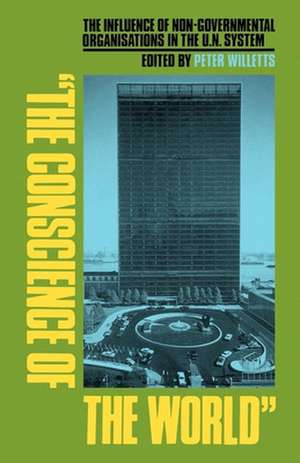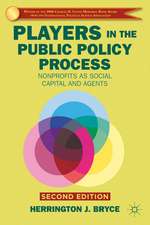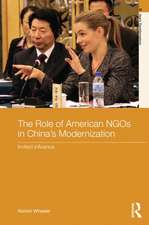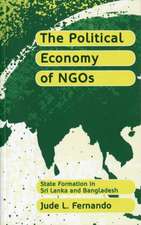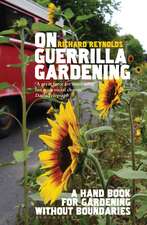"The Conscience of the World": The Influence of Non-Governmental Organisations in the UN System
Editat de Peter Willettsen Limba Engleză Paperback – 1996
Private groups, such as Amnesty International and Save the Children Fund, have had a formal consultative status with the United Nations since its founding. Such groups--known as nongovernmental organizations, or NGOs--have come to exert considerable influence on the UN's agenda setting, decisionmaking, and policy implementation. This book examines the role of the NGOs in world politics and the accomplishments of selected groups dealing with the environment, women's rights, children's problems, human rights, and refugee and famine crises.
Although these organizations and the UN generally act as partners and collaborators, there are also some tensions, as the NGOs do not have voting status and must remain independent and innovative. In the area of human rights, in particular, the NGOs have applied slow but steady pressure to force the UN to institute real sanctions against individual governments, thus earning the title "conscience of the world."
Contributors are Seamus Cleary, formerly at the Catholic Fund for Overseas Development; Jane Connors, senior lecturer in law at London University and specialist in women's rights; Helena Cook, former legal officer of Amnesty International; Richard Hoggart, former assistant director-general of UNESCO; Michael Longford, UK representative to several international groups; Sally Morphet, UK Foreign and Commonwealth Office; Angela Penrose, Save the Children Fund; John Sankey, former UK representative to the UN in Geneva; John Seaman, Save the Children Fund; Bill Seary, formerly at the National Council for Voluntary Organizations; Henry Steel, leader of the UK delegation to the UN Human Rights Commission; and Douglas Williams, former deputy secretary of the UK Ministry of Overseas Development.
Copublished with the David Davies Memorial Institute of International Studies
Available through Brookings in North America only
Although these organizations and the UN generally act as partners and collaborators, there are also some tensions, as the NGOs do not have voting status and must remain independent and innovative. In the area of human rights, in particular, the NGOs have applied slow but steady pressure to force the UN to institute real sanctions against individual governments, thus earning the title "conscience of the world."
Contributors are Seamus Cleary, formerly at the Catholic Fund for Overseas Development; Jane Connors, senior lecturer in law at London University and specialist in women's rights; Helena Cook, former legal officer of Amnesty International; Richard Hoggart, former assistant director-general of UNESCO; Michael Longford, UK representative to several international groups; Sally Morphet, UK Foreign and Commonwealth Office; Angela Penrose, Save the Children Fund; John Sankey, former UK representative to the UN in Geneva; John Seaman, Save the Children Fund; Bill Seary, formerly at the National Council for Voluntary Organizations; Henry Steel, leader of the UK delegation to the UN Human Rights Commission; and Douglas Williams, former deputy secretary of the UK Ministry of Overseas Development.
Copublished with the David Davies Memorial Institute of International Studies
Available through Brookings in North America only
Preț: 219.43 lei
Nou
Puncte Express: 329
Preț estimativ în valută:
41.99€ • 44.90$ • 35.01£
41.99€ • 44.90$ • 35.01£
Carte tipărită la comandă
Livrare economică 17 aprilie-01 mai
Preluare comenzi: 021 569.72.76
Specificații
ISBN-13: 9780815794196
ISBN-10: 0815794193
Pagini: 348
Ilustrații: black & white illustrations
Dimensiuni: 152 x 229 x 18 mm
Greutate: 0.48 kg
Ediția:New.
Editura: Brookings Institution Press
Colecția Brookings Institution Press
ISBN-10: 0815794193
Pagini: 348
Ilustrații: black & white illustrations
Dimensiuni: 152 x 229 x 18 mm
Greutate: 0.48 kg
Ediția:New.
Editura: Brookings Institution Press
Colecția Brookings Institution Press
Notă biografică
Peter Willetts is a reader in international relations at City University in London.
Descriere
Private groups, such as Amnesty International and Save the Children Fund, have had a formal consultative status with the United Nations since its founding. Such groups--known as nongovernmental organizations, or NGOs--have come to exert considerable influence on the UN's agenda setting, decisionmaking, and policy implementation. This book examines the role of the NGOs in world politics and the accomplishments of selected groups dealing with the environment, women's rights, children's problems, human rights, and refugee and famine crises.
Although these organizations and the UN generally act as partners and collaborators, there are also some tensions, as the NGOs do not have voting status and must remain independent and innovative. In the area of human rights, in particular, the NGOs have applied slow but steady pressure to force the UN to institute real sanctions against individual governments, thus earning the title "conscience of the world."
Contributors are Seamus Cleary, formerly at the Catholic Fund for Overseas Development; Jane Connors, senior lecturer in law at London University and specialist in women's rights; Helena Cook, former legal officer of Amnesty International; Richard Hoggart, former assistant director-general of UNESCO; Michael Longford, UK representative to several international groups; Sally Morphet, UK Foreign and Commonwealth Office; Angela Penrose, Save the Children Fund; John Sankey, former UK representative to the UN in Geneva; John Seaman, Save the Children Fund; Bill Seary, formerly at the National Council for Voluntary Organizations; Henry Steel, leader of the UK delegation to the UN Human Rights Commission; and Douglas Williams, former deputy secretary of the UK Ministry of Overseas Development.
Copublished with the David Davies Memorial Institute of International Studies
Available through Brookings in North America only
Although these organizations and the UN generally act as partners and collaborators, there are also some tensions, as the NGOs do not have voting status and must remain independent and innovative. In the area of human rights, in particular, the NGOs have applied slow but steady pressure to force the UN to institute real sanctions against individual governments, thus earning the title "conscience of the world."
Contributors are Seamus Cleary, formerly at the Catholic Fund for Overseas Development; Jane Connors, senior lecturer in law at London University and specialist in women's rights; Helena Cook, former legal officer of Amnesty International; Richard Hoggart, former assistant director-general of UNESCO; Michael Longford, UK representative to several international groups; Sally Morphet, UK Foreign and Commonwealth Office; Angela Penrose, Save the Children Fund; John Sankey, former UK representative to the UN in Geneva; John Seaman, Save the Children Fund; Bill Seary, formerly at the National Council for Voluntary Organizations; Henry Steel, leader of the UK delegation to the UN Human Rights Commission; and Douglas Williams, former deputy secretary of the UK Ministry of Overseas Development.
Copublished with the David Davies Memorial Institute of International Studies
Available through Brookings in North America only
